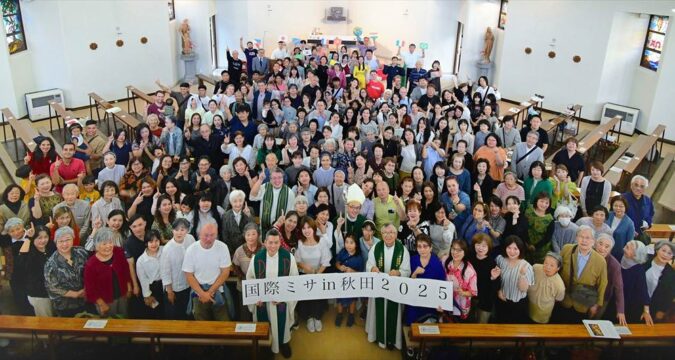
NIIGATA (LiCAS News): More than 150 Catholics from across Akita Prefecture and neighbouring Yamagata filled Akita Church on September 28 for the fourth Akita District International Mass.
The Mass blended cultures, languages, and traditions in a single act of worship. Parishioners from the Philippines, Vietnam, Indonesia, Benin, France, Italy, Korea, Egypt, Brazil, and Japan joined the celebration which was marked by participation in many languages: readings, prayers of the faithful, and hymns were offered in Vietnamese, English, Japanese, and other tongues.
Bishop Daisuke Narui presided at the liturgy and delivered the homily in Japanese and English, while a Vietnamese translation was printed in the programme.
Parts of the Eucharistic Prayer were read in Portuguese and Filipino, and the Lord’s Prayer was recited in both Japanese and Vietnamese.
Bishop Narui said that rather than creating confusion, the use of many languages “was marked by unity—surely because everyone shared the same desire to be one in prayer.”
After the Mass, parishioners and guests gathered under tents for a fellowship meal, where Japanese, Filipino, and Vietnamese food was shared
During the Mass, participants learned how to say “hello” in various languages before exchanging greetings with one another.
After the Mass, parishioners and guests gathered under tents for a fellowship meal, where Japanese, Filipino, and Vietnamese food was shared.
The highlight of the gathering was a dance performed by the Sisters of the Sacred Heart Missionary Congregation, which drew children into the celebration.
International Masses often see greater participation from foreign-born Catholics, with fewer Japanese in attendance. But this year was different. “This year, many Japanese parishioners joined, creating a rich sense of fellowship,” Bishop Narui observed.
Gospel challenge: for whom do we live?
In his homily, Bishop Narui reflected on the day’s gospel of the rich man and poor Lazarus, underscoring that the parable reveals “what God desires.”
He stressed, “The important issue is not whether one has wealth or not. The real question is: For whom do we live?” He added, “Human beings are not made to live only for themselves or for their own kind.”
The important issue is not whether one has wealth or not. The real question is: For whom do we live?” He added, “Human beings are not made to live only for themselves or for their own kind
Bishop Narui
The bishop warned against a way of life that “stops the flow of life” by taking without sharing.
“They exploit nature, produce and consume excessively, and waste without concern. They buy what they want without caring if others—nearby or in other countries—are suffering,” he said.
Migrants as ‘missionaries of hope’
The International Mass also coincided with the Church’s observance of the World Day of Migrants and Refugees. Quoting the papal message for the occasion, Bishop Narui said:
“Catholic migrants and refugees can become missionaries of hope in the countries that receive them. By their spiritual zeal and vitality, they can help rejuvenate communities of the Church that have become rigid or inactive. Therefore, the presence of Catholic migrants and refugees must be recognised and valued as a true blessing of God.”
The bishop said the Diocese of Niigata “is truly blessed, with so many migrants among us,” adding that when people meet and “enter into each other’s cultures, each of us becomes a blessing.”
He said, “Together, we form a blessed community.”
Catholic migrants and refugees can become missionaries of hope in the countries that receive them. By their spiritual zeal and vitality, they can help rejuvenate communities of the Church that have become rigid or inactive
Bishop Narui
Bishop Narui reminded the faithful that Jesus is the model for Christian communion. “He crossed not just national boundaries but the boundary between God and humanity to dwell with us, to give us life.”
He said, “May we walk as a community that follows Jesus—sharing what we have not only for ourselves but especially for those like Lazarus.”



